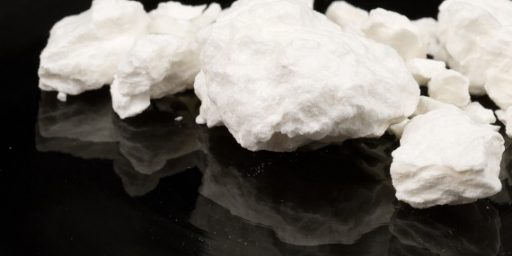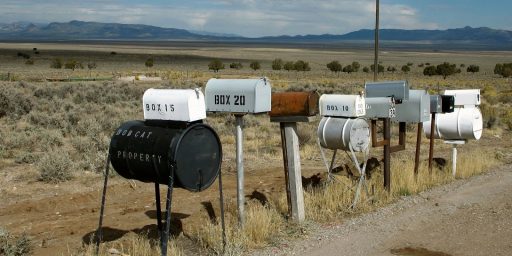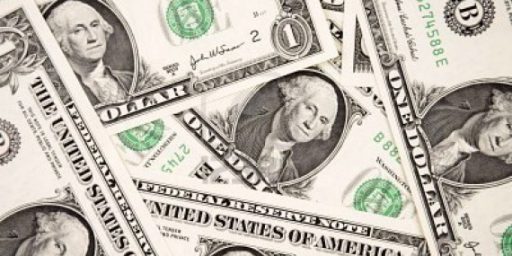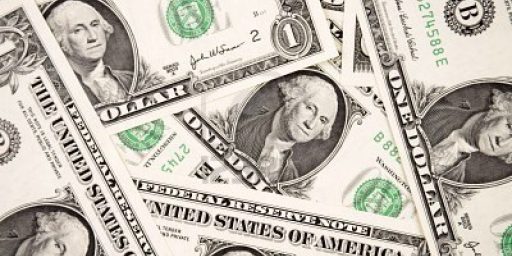Underground Economy
Sudhir Venkatesh has conducted a lengthy, anecdotal study of the black market in the Chicago slums, which he details in Off the Books: The Underground Economy of the Urban Poor. Slate‘s ‘s new book on the underground economy. Slate‘s Patrick Radden Keefe provides a precis.
The people in Off the Books are struggling, and their many informal transactions represent a kind of adaptive strategy —and often an indigenous social safety net. Private property is a luxury in the neighborhood, so for $300 a pop, a restaurant doubles as a gambling hall on the weekends; prostitutes use the back room of the dollar store; the currency exchange sells fake Social Security cards obtained by a local pastor. All of this gives new meaning to the urban planning notion of “mixed use.”
Similarly, neighborhood residents get around bad credit by borrowing what money they need within the community. Debts aren’t always repaid with money. Venkatesh charts the degree to which promises and payments in kind substitute for cash. Small businesses give homeless people a place to sleep in exchange for food because it’s cheaper than paying a night watchman; a prostitute and a grocer transact business without ever opening their wallets. Leroy, a mechanic, eventually gets rid of his cash register, because “his customers seemed unable to pay with our nation’s legal tender.”
In his efforts to demonstrate that this shadow economy is anything but the desperate Hobbesian scramble an outsider might assume, Venkatesh can at times sound like Jane Jacobs extolling the civic merits of Manhattan’s West Village. “Beneath the closed storefronts, burned-out buildings, potholed boulevards, and empty lots, there is an intricate, fertile web of exchange, tied together by people with tremendous human capital and craftsmanship,” he writes. In this view, even Big Cat [the neighborhood pimp] is a “stakeholder” in the neighborhood, with an interest in seeing norms adhered to and order preserved. “It’s not a crack house,” as an old Onion headline had it. “It’s a crack home.”
Heartwarming.






And soccer moms trade carpooling, suburban dads trade stock tips and my children do chores around the house like setting the table, emptying the dishwasher, taking out the trash etc.
There is non-monetary exchange of services in all parts of society. Heck, I even have an active trade going with this guy who rounds up interesting information, provides a bit of commentary about it and then presents it to me in a clear an entertaining fashion, all in exchange for some of my time at his blog which he in turn trades to others for cash.
Yeah, the notion that “how the other half lives” is rooted in some noble native ingenuity that the middle and upper classes have forgotten or forsaken is a cherished leftist myth. All that’s really happened is that people have learned to cope with, and therefor tolerate, a situation they should instead be trying to find a way to escape…
M. Murcek, that was an awesome comment, seriously. Very cool.
And how prevalent can some metropolitan underground economy be? The USA is already an extremely efficient capitalist economy-and would be more so if it weren’t for all the liberals. In fact, there would be by far fewer poor people if we had less government interference.
By the way, a store owner that lets prostitutes use the back isn’t a store owner, he is a pimp. A restaurant that closes on the weekends to be a gambling hall isn’t a restaurant, it is a gambling hall. And if you are a mechanic who can’t get cash for jobs, you are a crappy mechanic.
I imagine the police will be checking out a few things there if they read the book. That is if half of the things the book says are even true.
It’s actually both.
Genius.
“Yeah, the notion that “how the other half lives†is rooted in some noble native ingenuity that the middle and upper classes have forgotten or forsaken is a cherished leftist myth.”
What an absurd comment.
No leftist has ever imagined that the upper classes have forgotten their native ingenuity. It is on constant display in all the ways in which they manage to avoid paying their fair share of taxes, or establish private clubby networks of extra-legal influence peddling and mutual back-scratching.
And the cluelessness continues.
“All that’s really happened is that people have learned to cope with, and therefor tolerate, a situation they should instead be trying to find a way to escape”
These methods that people use to cope with poverty ARE efforts to escape that poverty. People will find a way to survive, and seize opportunities to enrich themselves using whatever tools they see as available to them. That is why lefties advocate making opportunities for constructive enrichment more available to those who will otherwise resort to less constructive means.
Yeah, turning tricks on the floor in back of the corner store can no doubt be parlayed into a scholarship that leads to an education that leads to a good job in the above-board economy. By the same token, trading a few rocks of crack for a patched tire will no doubt move that mechanic from the ‘hood right up to a job at the local Cadillac dealership. All real constructive…
jpe, how can it be both? A RESTAURANT that closes on the WEEKENDS. Catch a clue dude.
Tano, I’m trying to decide if you’re clueless or mendacious with comments like:
You guys somehow feel that the wealthy’s fair share of taxes is in the neighborhood of 40% or more, whereas if I’m poor enough, not only do I not pay taxes, the government gives me money.
You seem to want life to be “fair.” Some of us recognize that, no matter how hard we try, life will never be fair. Besides, we prefer “freedom” over “fairness” any day.
Boyd,
Huh?
While having the old debate about whether rich people should contribute more to the society that enables their wealth might be an interesting exercise, that really isnt what this thread is about, nor was it what my comment was about.
The issue is, given the tax structure we have in place, rich people use all manner of ingenious means to legally or illegally escape the tax burden that our democratic system has decided on. That seems pretty obvious.
And my comment was to someone who claimed that lefties imagine that the rich are not hustlers. We are under no such illusion.
Where I live, in semi-rural Western Washington, there is a considerable black market underground economy of the working rural poor. Mostly they live by doing cash jobs for the wealthy or upper class retirees that have moved out here from one of the cities. The off-the-books workers do yard work, dog walking, elder care, house repairs, remodelling, you name it, for cash. These folks do not pay income tax, insure themselves or their cars and barter with their neighbors for things they cannot afford or cannot make. There is another rural economy in meth, bear parts, illegal harvesting of forest products etc, but is still on the periphery, fortunately.
The decline of the middle class is not a myth although I understand why some people prefer to ignore the facts.
lily, you have been smoking the liberal crack pipe again, haven’t you? I don’t think the article was referring to hobos and bums, drunks and addicts. But then again, maybe it was.
Get on your knees and thank God for the great economy we have now, and think of George Bush while you are doing it.